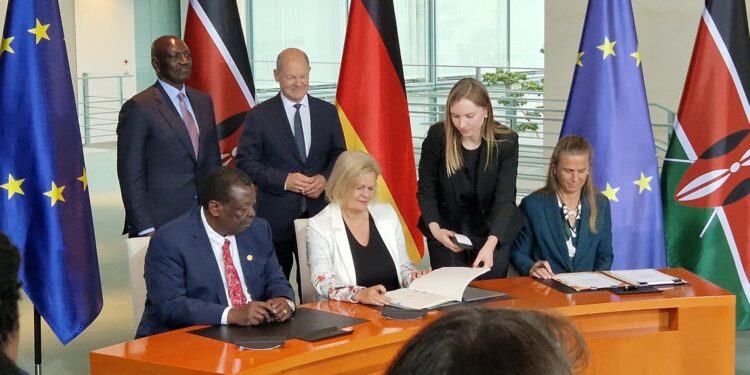Kenya and Germany continue to be on a stronger path of bolstering their bilateral ties in various aspects, including the latest agreement that will allow thousands of skilled and semi-skilled Kenyans to hold grip on employment opportunities in Germany.
President Ruto landed in Germany, marking his 66th international trip in two years since assuming office in 2022. His administration has maintained that labor exportation is the only way to curb the burgeoning unemployment crisis in Kenya.
As of today, the National Employment Authority had cross-border jobs and agencies on its website—exporting labor amounting to over 2000. The government seeks to send laborers to Germany on a skilled-work visa basis to bale out the aging German population.
However, the agreement will also open doors for Kenyan students, control illegal migration, and stabilize the welfare of Kenyan workers in the country.
The foreign ministers of Kenya and Germany signed the Kenya-German Comprehensive Migration and Mobilty Partnership agreement on September 13, 2024. It will serve as a framework for collaboration and information sharing on labor mobility, apprenticeship, student training, labor market needs, employment, and worker welfare.
The agreement is set to service the German labor shortages by pumping the Kenyan skilled workers into various labor gaps.
On combating the influx of migrants, exploitation of labor, and human trafficking, the agreement will initiate close relations between the two countries to foster a framework for ethical and fair recruitment of Kenyan talents.
The German government, through its applicable law, shall be issuing long-stay visas for residence to eligible Kenyans for study and vocational training. Kenyans may extend their studies for two years through a temporary study permit upon expiry of their long-stay visas.
The temporary study permit is also subject to further extension if the purpose of residence is not yet achieved but achievable within a reasonable period. Upon completion of their vocational training and studies, students who may wish to work can do so within the framework of German applicable law.
However, both governments will closely cooperate to ease the job-seeking process for those wishing and permitted to work in Germany.
Regarding skilled worker immigration, both governments will support individuals who have completed their training or obtained a university degree, provided that the local authorities and other partners recognize their qualifications.
However, employment of skilled workers will not require a job market test; the application is subject to review to ensure that the person meets the requirements to enter Germany, work there, and live there.
The German government will also make the entry of IT specialists who are skilled but do not have formal qualifications to exploit their labor market effortlessly.
The agreement is seeking to address labor market needs and bolster bilateral relations between both countries. The deal will also promote skills and knowledge exchange and enhance cooperation on migration management.
Kenya is currently grappling with the growing unemployed youths, while Germany is dazing at its aging population worsened by the decreasing birth rates year-by-year. Ruto has vowed to travel and look for more jobs abroad, which is also the basis for strengthening the country’s dwindling foreign reserve.





